'With this money, I’d be a king in Somalia': How Russia recruits foreigners for war against Ukraine
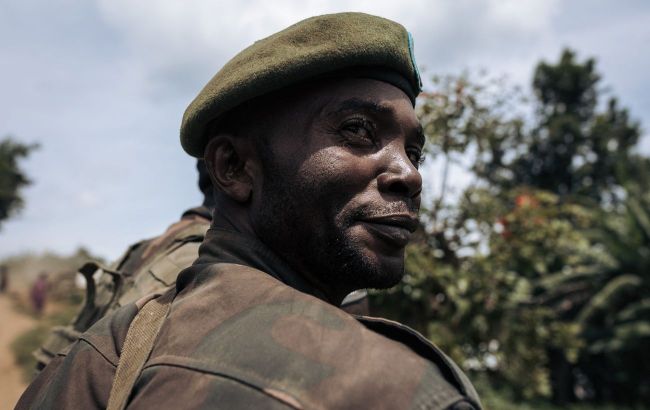 An African man in one of the military units (illustrative photo: Getty Images)
An African man in one of the military units (illustrative photo: Getty Images)
Russia is recruiting Africans and Asians in an attempt to impose and consolidate the Russian world in foreign countries. RBC-Ukraine explains how this happens, what Africans do at the front, how they end up in captivity, and what they think of Russians afterward.
Russia regularly recruits foreigners to participate in the war against Ukraine. In order not to launch a general mobilization and to make do with existing resources, the Kremlin has launched a large-scale campaign in countries that either remain neutral or support Russia.
The people of African countries have long been used by Russia as a resource for numerous military conflicts. Russian propaganda in Africa has been rooted since the Soviet era and still influences the local population.
For the war against Ukraine, the Russians, without changing their established schemes, also began to actively recruit residents of both African and Asian countries. Not only did the Kremlin engage in headhunting there, but it also began to look for Africans and Asians in its own country. Taking advantage of their helplessness and desire to make money, the Russians force foreigners to sign a contract with the Ministry of Defense and send them on meat assaults. Some Africans managed to get into Ukrainian captivity and, accordingly, survive.
Russian mercenaries
The fact that people from African and Middle Eastern countries would fight in the Russian army became known at the beginning of Russia's full-scale invasion of Ukraine. Back in March 2022, Sergei Shoigu, who was then Minister of Defense, said that more than 16,000 militants from the Middle East had volunteered to fight in the Russian army.
Since then, recruitment campaigns have not stopped. In December 2023, Le Monde reported that mercenaries from Africa are serving in the Russian army as part of the African Corps of Russia. It is noteworthy that during World War II, the Wehrmacht also had mercenaries from Africa as part of the Afrika Korps.
At first, Africans were booked for their needs by the commanders of the Wagner PMC. Their leader at the time, Yevgeny Prigozhin, often organized expeditions to the African continent, mainly to countries where local military conflicts had not subsided for years. As in the case of Russian prisoners, the Russian Ministry of Defense borrowed this tradition from Wagner, and after Prigozhin's death, the department's officials began to visit Africa frequently. Deputy Minister Yunus-Bek Yevkurov alone traveled to Libya, Mali, Burkina Faso, and Niger, outlining Russia's new spheres of influence on the African continent.
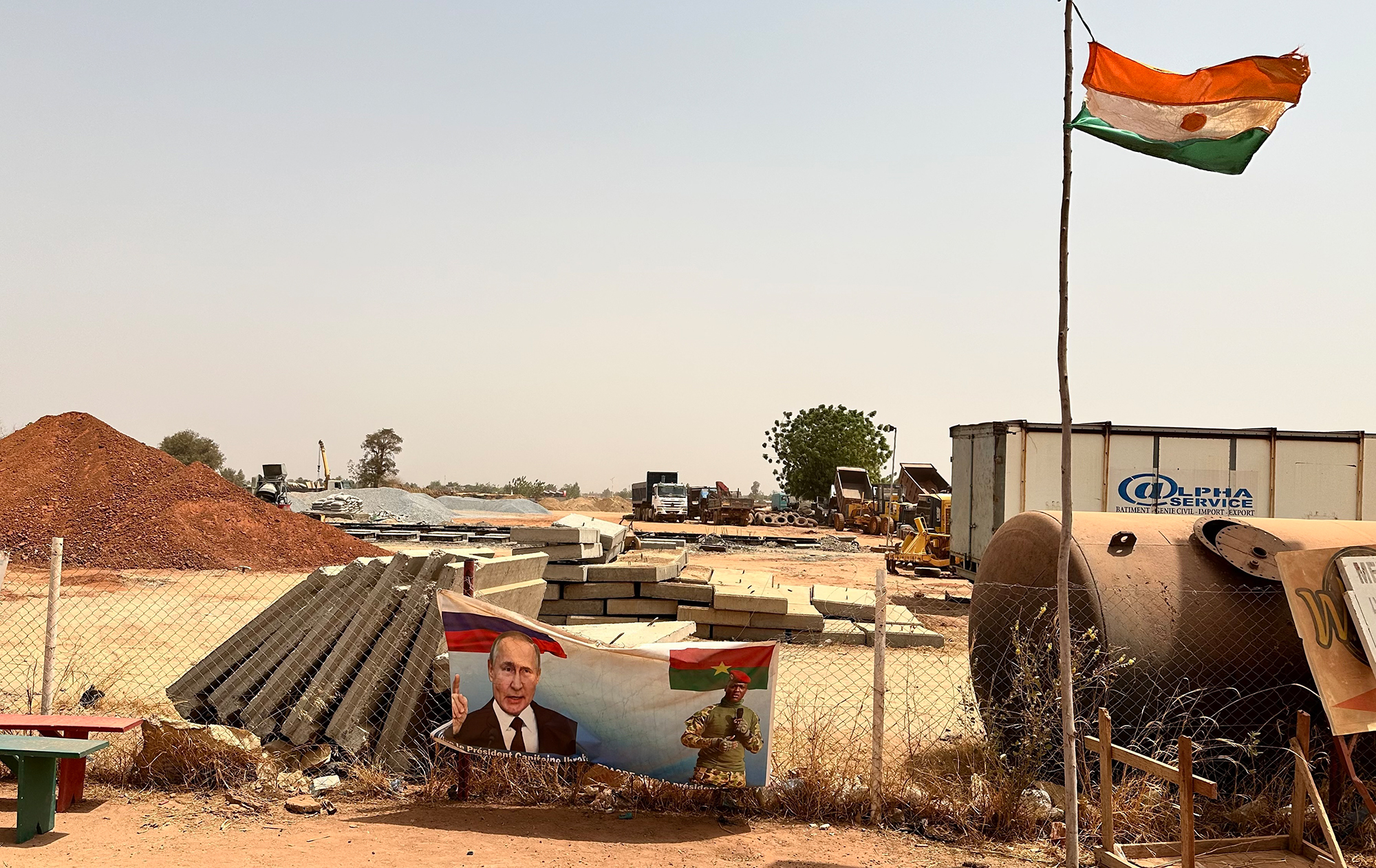 Poster with Putin in Burkina Faso (photo: Getty Images)
Poster with Putin in Burkina Faso (photo: Getty Images)
In September 2024, these countries, where Yevkurov visited, announced the formation of the Alliance of Sahelian States. Russia needs the African Corps not only for the war in Ukraine but also to resolve local conflicts, including problems with the redistribution of spheres of influence with the Wagner PMC.
But still, the main military goal for Russia today remains the occupation of Ukrainian territories, so the emphasis is on it. In May 2024, the Defense Intelligence of Ukraine reported that the Russians continue to recruit Africans. Now they are offered $2,200 a month for work at the front and a one-time payment of $2,000 for signing a contract.
The intelligence service reported that the main recruitment takes place among residents of Central African countries - Burundi, Congo, Rwanda, and Uganda. Africans are recruited and sent to the front line, where they die participating in meat attacks.
"A specially created unit of the Russian Ministry of Defense is recruiting Africans to participate in meat attacks on Ukrainian soil. The mercenaries are promised medical insurance, as well as a Russian passport for the soldier and his family members,” the DIU says.
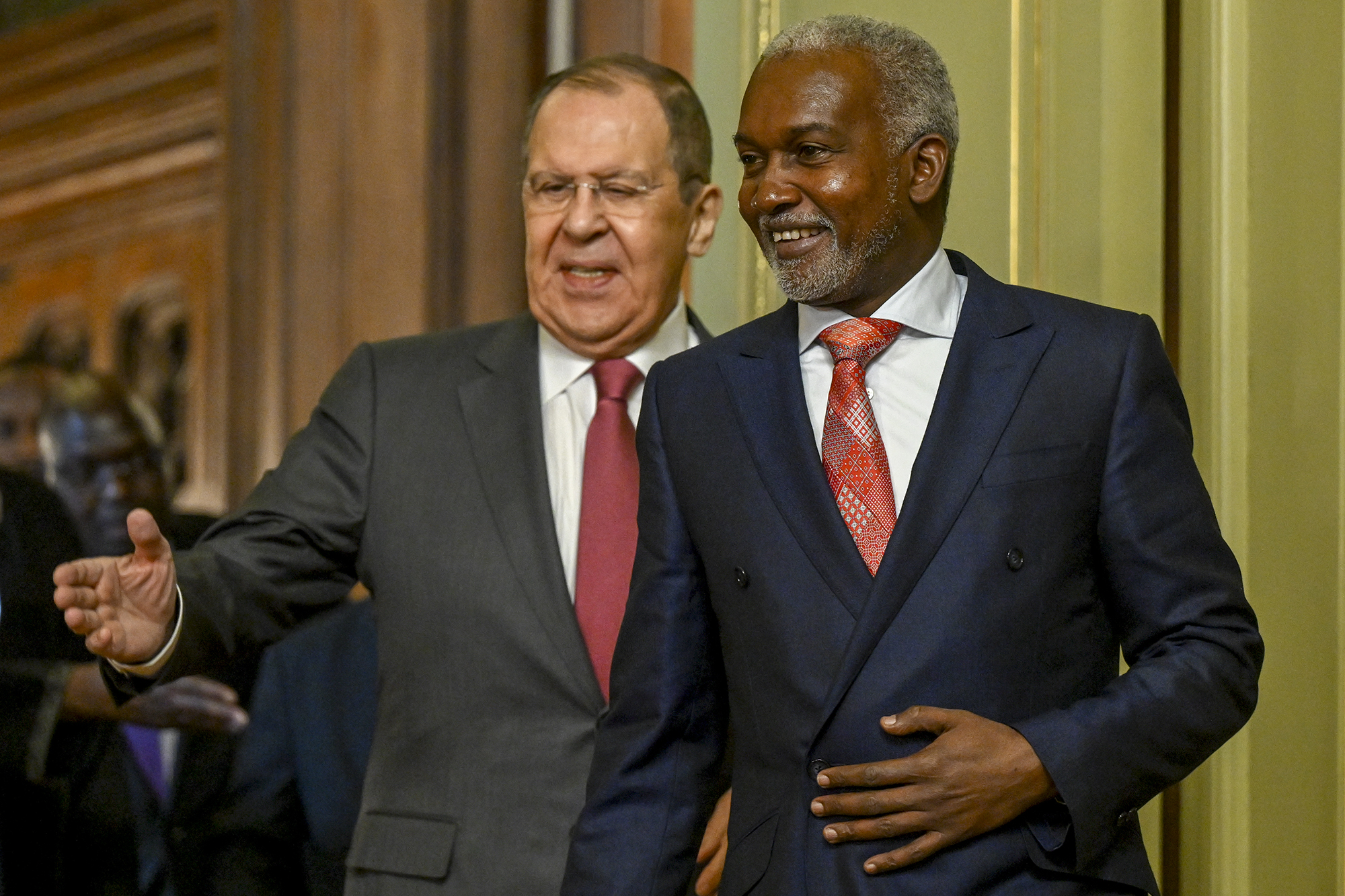 Russian Foreign Minister Sergei Lavrov and Nigerian Foreign Minister Yusuf Maitama Tuggar at a meeting in Moscow in March 2024 (photo: Getty Images)
Russian Foreign Minister Sergei Lavrov and Nigerian Foreign Minister Yusuf Maitama Tuggar at a meeting in Moscow in March 2024 (photo: Getty Images)
But many Africans, as well as South Asians, come to Russia on their own in an attempt to find part-time work. Representatives of the Russian Defense Ministry immediately identify them, offer to sign a contract, promise money and a social package, and then send them to the front.
Later, when captured by the Ukrainian Armed Forces, mercenaries claimed that they did not know where they were going and what they would be forced to do. However, judging by the extensive recruitment process in their countries, most of them understood the purpose of their arrival in Russia, as Petro Yatsenko, a representative of the Coordination Headquarters for the Treatment of Prisoners of War, says.
"They are recruited under the guise of work, they end up in the Russian army or those who are already in Russia are deceived and told that they will go to guard something. But we cannot always verify the authenticity of their testimony. Perhaps most of them do know where they will end up,” Yatsenko says in a comment to RBC-Ukraine.
Nepal and Sri Lanka
When spreading its propaganda, Russia does not forget about South Asia. Fact-checkers regularly find entire networks of pro-Russian bots in the South Asian segment of social media. As such, there are no recruits to the Russian army on the ground in South Asia. However since most countries in this region have a difficult economic situation, locals often agree to various adventures.
Nepal is one of the least developed countries in the world, with high unemployment, so many people live below the poverty line. The Kremlin, realizing the potential, is recruiting Nepalis for the war, despite the Nepalese government's requests not to do so.
Madan Kumal came to Russia on his own to work. After a short search, Madan met a man who offered him a job contract. As soon as the documents were signed, the Nepali was sent for training and then to the front line. The man did not want to accept his situation, so he somehow found an opportunity to go to Moscow, to the Nepalese embassy.
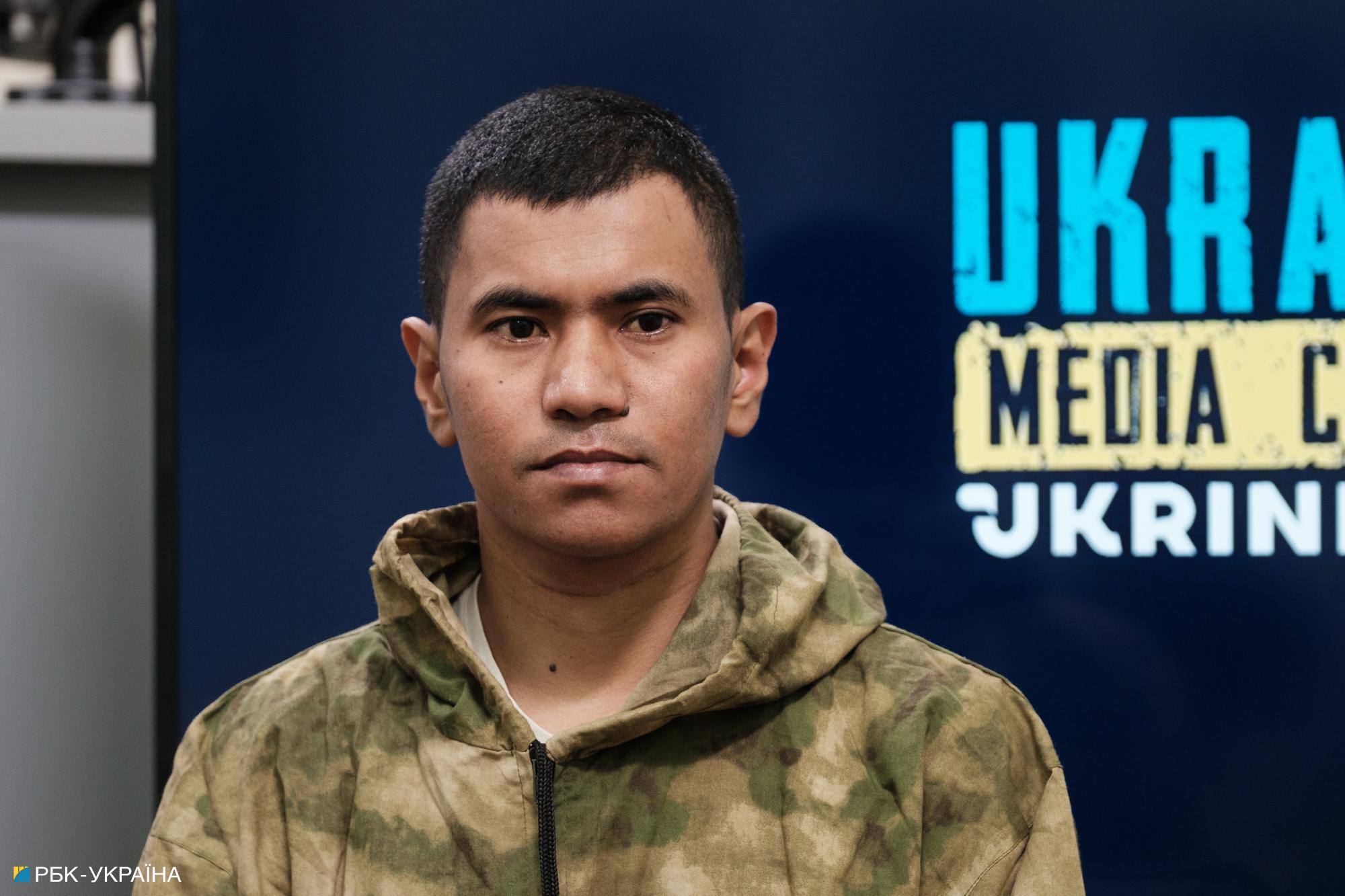 Madan Kumal (photo: Vitalii Nosach/RBC-Ukraine)
Madan Kumal (photo: Vitalii Nosach/RBC-Ukraine)
- I decided that I couldn't go on like this and I had to go to Moscow. I had money and one night I took a taxi to Moscow. I wanted to get to the Nepalese embassy. They helped me there, and I called a taxi to the airport. I was detained at the airport. Three days later I was back in Donetsk,” Madan tells RBC-Ukraine.
To prevent the Nepali from escaping again, his passport was taken away, surveillance was established, and then he was sent to the assault. The three of them - he and two Russians - went towards the Ukrainian positions. When the moment was right, Madan escaped.
- I did not know where I was going. I just ran through the woods. I was wandering in the forest for two days. And one day, six Ukrainian soldiers found me. I decided to surrender. And they took me to Ukraine.
Telling his story, Madan smiles politely all the time but speaks little and quickly, listing facts. His friend, Fernando Kulasuriya, a resident of Sri Lanka, on the other hand, frowns and looks down at his forehead, but relaxes a bit as he talks.
Fernando knew that he was signing a contract for military work, but he did not know that it would be at the front - he was allegedly convinced that he would just help, not take part in hostilities. He was promised a considerable salary for him - 95 thousand rubles or a thousand dollars. Then, just like everyone else, he spent two weeks in Rostov for training and then occupied Donetsk.
- For the first month, I stayed put, living in Ukrainian houses. I cut wood for heating and boiling water and delivered food, canned food, and water to the bases. A month later, the commander told one Sri Lankan that he had to go to the front line. He refused because he had no experience and was afraid. For this, his phone was taken away from him, he was beaten and not given food for three days. I saw it all.
After a while, the Russian commander came to Fernando and told him that he had to go to the front line. He tried to refuse, citing his sore leg, but the soldier didn't care much - he had to carry water for the soldiers on the front line.
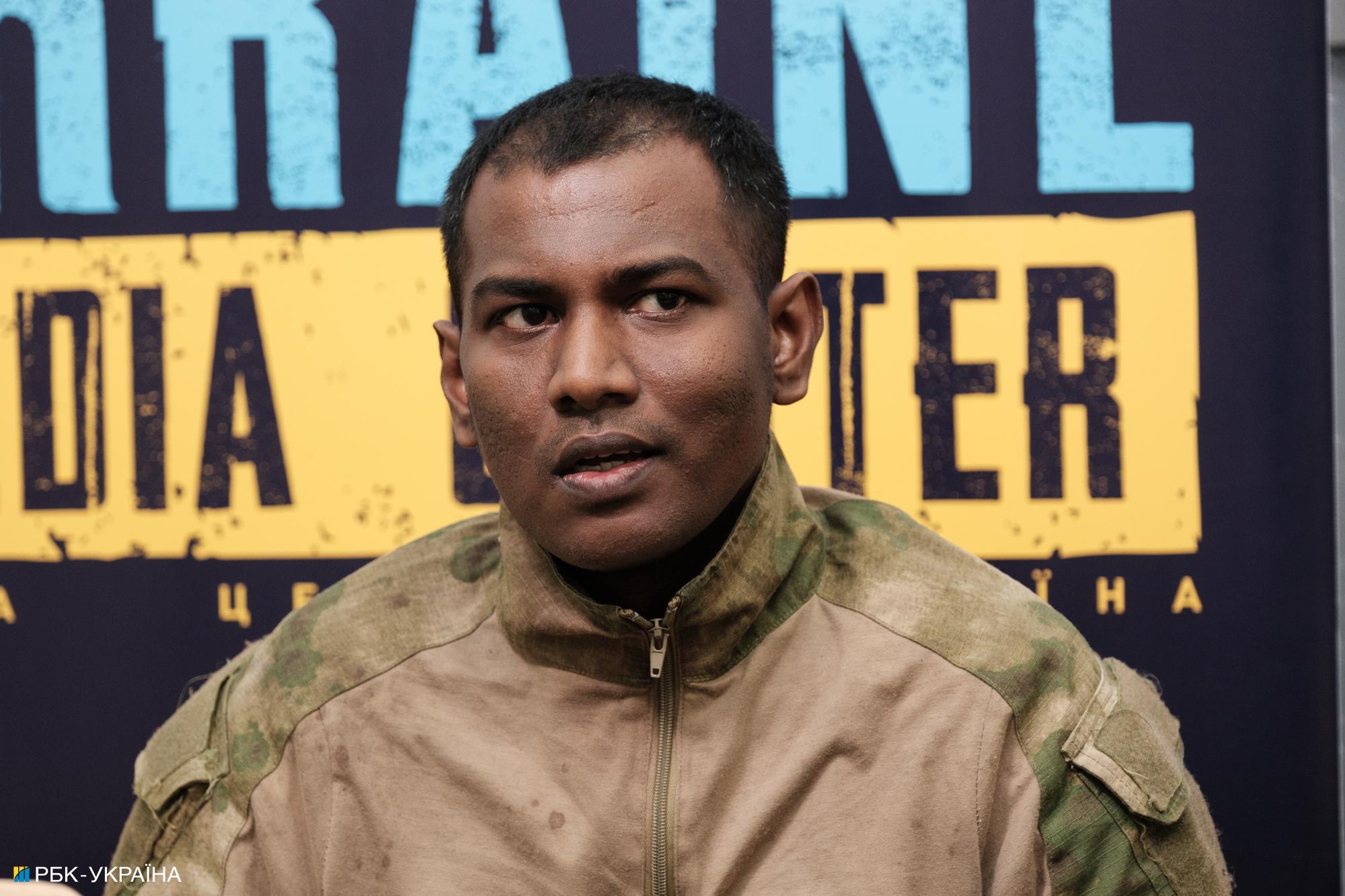 Fernando Kulasuriya (photo: Vitalii Nosach/RBC-Ukraine)
Fernando Kulasuriya (photo: Vitalii Nosach/RBC-Ukraine)
The man drove to the front with the Russian soldier. When the car stopped, they got out and walked. It was dark, a drone was following the military, and at some point, Fernando lost track of the Russian walking ahead. He was told on the radio to go to the right, but he became disoriented and went into the forest. There, a Ukrainian drone caught him and dropped a shell on him, injuring his leg.
- In the evening I started crawling. The next morning I found a trench and stayed there. I saw three Ukrainian soldiers. I told them I was from Sri Lanka. I said that I had not eaten anything for two days. They gave me something to eat and told the commander - his name was Fernando, he was from Sri Lanka. They let me sleep overnight and gave me tea.
Both men are glad to be in Ukrainian captivity and note that this is the only way for mercenaries to survive. Both Madan and Fernando want to go home, but it is not yet known how the process of their return will go.
Somalia and Sierra Leone
In many countries on the African continent, various military conflicts periodically erupt - some countries attack others, fight for territories, or raise revolutions in an attempt to overthrow another dictator. Somalia is no exception.
In addition to the constant threat from al-Qaeda's al-Shabab affiliate, Somalia conflicts with Ethiopia because the latter recognized the independent state of Somaliland. Until 1960, these territories were a British colony, then Somaliland was part of Somalia, and in 1991, after ten years of fighting the Somali military regime, the state seceded and declared its independence. It is noteworthy that the military regime in Somalia was actively supported by the Soviet Union. In other words, Somalia has not had a stable and peaceful life for decades.
This is how Somali Adil Abdulaki explained why he came to Moscow to look for work and why he ended up in Ukrainian captivity. He did not give any historical information but explained that life in Somalia was difficult and unpromising.
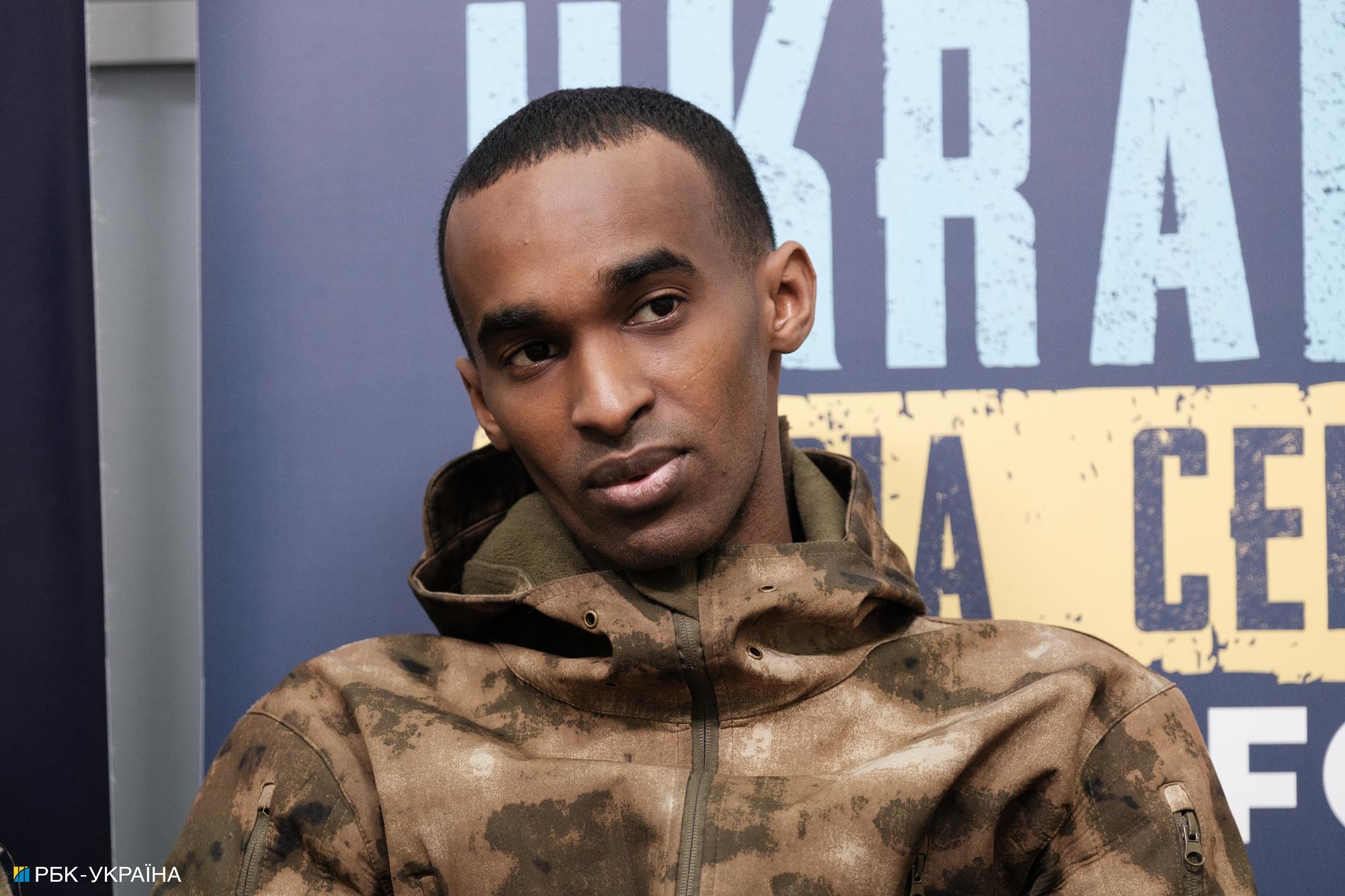 Adil Abdullaki (photo: Vitalii Nosach/RBC-Ukraine)
Adil Abdullaki (photo: Vitalii Nosach/RBC-Ukraine)
- I came to Russia on a tourist visa. I wanted to work. At home, I worked in a small factory, but I didn't have enough money. So I went to Moscow and saw an ad from the military. I thought they would hire me, but I didn't think I would end up at the front,” Adil tells RBC-Ukraine.
"Many Africans choose Russia as a country where they can make money. There are reasons for this: first, it is easier to get to Russia than to Europe, which has recently tightened the rules for entering and staying in its countries. Therefore, the same tourist visa is cheaper, and the reception is more friendly. Secondly, as mentioned above, the Kremlin itself is doing everything it can to make sure that the average African, deciding to go to make money, chooses Russia. Russian propaganda and calls to serve in the army for remuneration are actively spreading in African countries.
But Adil himself signed the contract in Moscow. As reported by the Defense Intelligence of Ukraine, he was promised two thousand dollars a month. The man does not hide the fact that this is a lot of money for Somalia.
- I signed the contract myself, and I saw the ads on the streets in Moscow. I didn't think I would end up at the front. I don't know, maybe as a security guard. They took my passport and I signed the contract. They promised me money - 2 thousand dollars a month.
- Is it a lot for Somalia?
- With this money, I would be a king in Somalia.
Richard Kanu from Sierra Leone is in a similar situation and also came to Russia to work. But while Adil admits that he understood who he was signing a contract with, Richard claims that he did not want to go into the military trade at all. Speaking about this, he keeps touching his breast pocket, adding that he usually carries a small Bible in it.
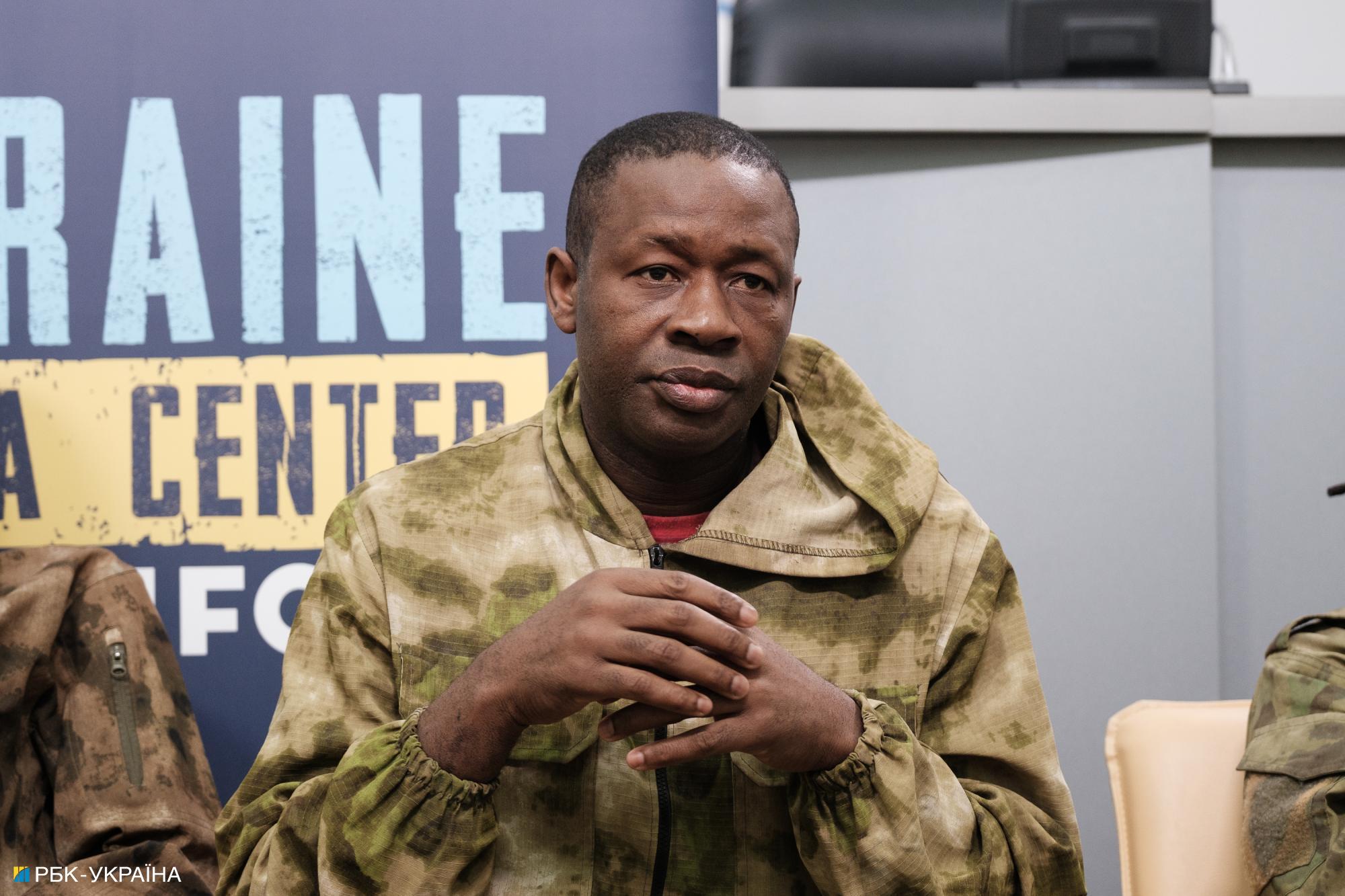 Richard Kanu (photo: Vitalii Nosach/RBC-Ukraine)
Richard Kanu (photo: Vitalii Nosach/RBC-Ukraine)
- I used to be a soldier in my country, so I didn't want to fight anymore. I just wanted to find a job, I can work anywhere to survive.
Richard flew first to Vladikavkaz and then to St. Petersburg, where he checked into a hotel. The African emphasizes that it was a five-star hotel because he could afford it - he had saved a lot of money for the trip. In Russia, he had a friend who was supposed to find him a job and prepare the appropriate documents for him. According to Richard, the acquaintance was most likely an employee of the Ministry of Defense. The documents turned out to be a contract for service in the Russian army.
- When I was in St. Petersburg, I received a call - I was spoken to in a language I did not understand, so I forwarded the call to him (an employee of the Ministry of Defense - ed.). He told me that they were accepting my contract. So I was going to study, at least I had work experience, and then I'd come to St. Petersburg or Moscow and work there. I said okay.
Both Richard and Adil completed their training in Rostov-on-Don, where their passports and phones were confiscated. Later, Richard got his phone back and immediately called his family to tell them where he was.
Adil gives the impression of a confident and even a little bit cocky guy - he does not make excuses, does not complain and several times corrects those who mispronounce his name. Richard, on the contrary, spends more than five minutes of his ten-minute story actively gesticulating and saying that he was deceived, that he did not want to join the army, and did not want to go to the front. Once he got to Rostov and then Donetsk, he said, he did nothing but try to find out what was going on.
- “I was with two Nepalese and one Iraqi, and we were saying the same thing - we don't want this contract, we don't want the contract. And they said they would send us to the front line. We asked a lot of questions, said we wanted to cancel the contract, went to the commander every day, and said cancel this contract. But we were not listened to.
The Russians used Africans as slaves outside of assaults and as shields during attacks. In addition, they were ridiculed for their skin color and lack of knowledge of the Russian language, as the Somali says.
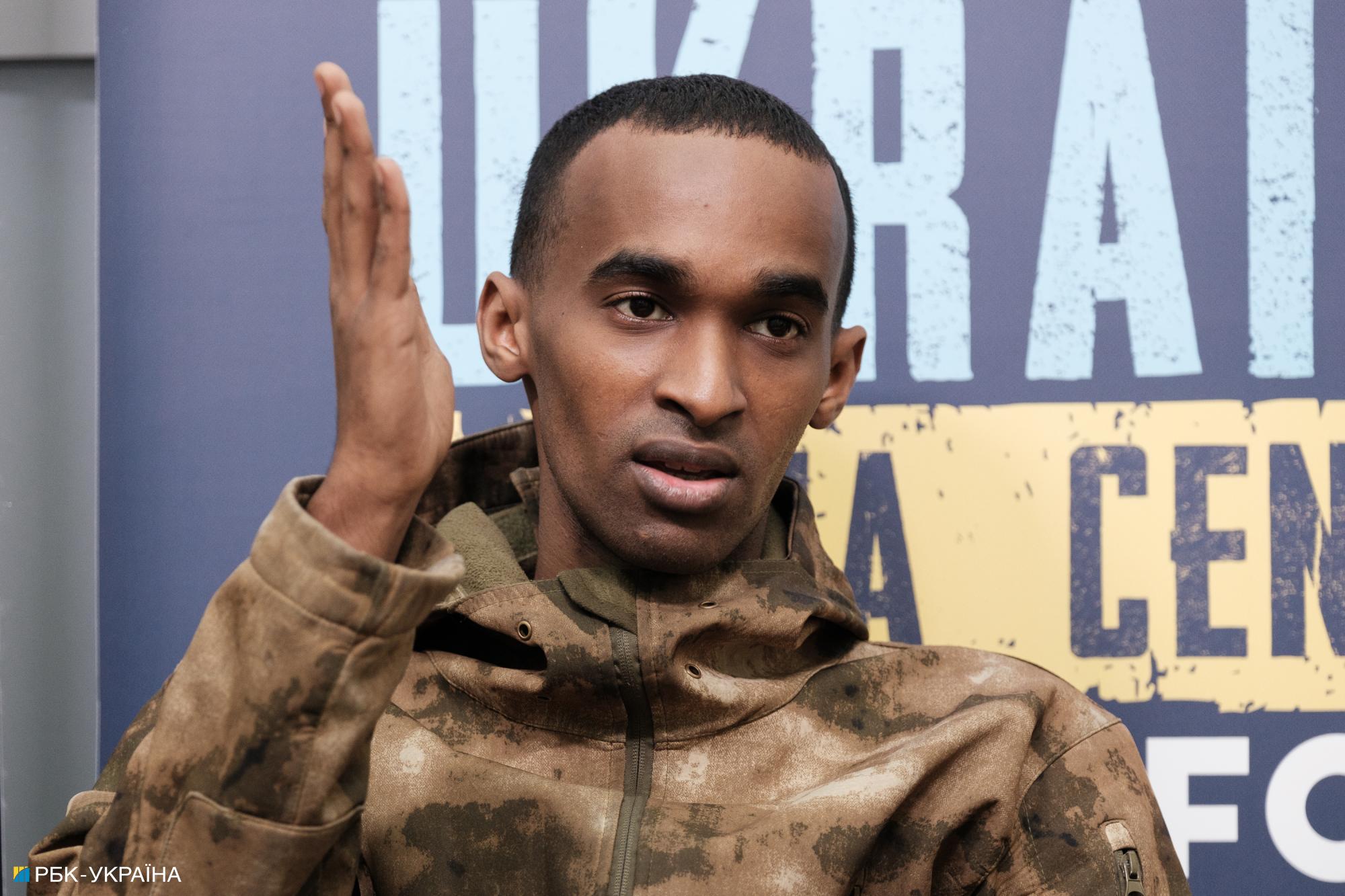 Adil Abdullaki (photo: Vitalii Nosach/RBC-Ukraine)
Adil Abdullaki (photo: Vitalii Nosach/RBC-Ukraine)
- How did your Russian colleagues treat you?
- Very badly. Because of my skin color, and because I didn't know their language, they thought I was stupid. The communication was terrible, they didn't give us food, they didn't give us anything for everyday life.
Richard agrees - they were not fed, and during the assaults, Russian soldiers with weapons stood behind them and did not allow them to take a step back. Both men stayed at the front for up to a week and then decided that the only way to survive was to go forward with their hands up.
- We broke away from the others and went. After six days at the front, we had no food and no water. My feet hurt, and my hands were so cold, because in Africa it's not cold, look at my hands. I had no boots, no helmet, no bulletproof vest. After six days of travel, there were three of us left - one died on the way.
The men were found by the Russian military and ordered to go back to the assault. Richard broke away from them, walked several kilometers, and wandered into a dilapidated house. Sitting in the house, the African took out his pocket Bible and decided to pray.
- I said: “Please lead me, lead me to righteousness.” Then I fell asleep, and God helped me. I heard Ukrainian soldiers and shouted, “I'm here!” They came into the house, checked if I had any weapons, and asked me my name. I said: "My name is Richard. I'm from Africa."
Both Adil and Richard say that they are treated well in captivity - like human beings, they say. When asked what they thought and what they think now about the war in Ukraine, both say that they did not go into details before. Now the Somali even draws parallels.
- I didn't know anything before. Now I understand the problem well, but then I thought it was a problem between two countries that could not divide the land. Later I realized that Russia is just trying to take away Ukrainian territory. And it's terrible. It reminds me of the conflict that happened in my country because Ethiopia also took away some of our territory. If someone takes something from you, it's bad.
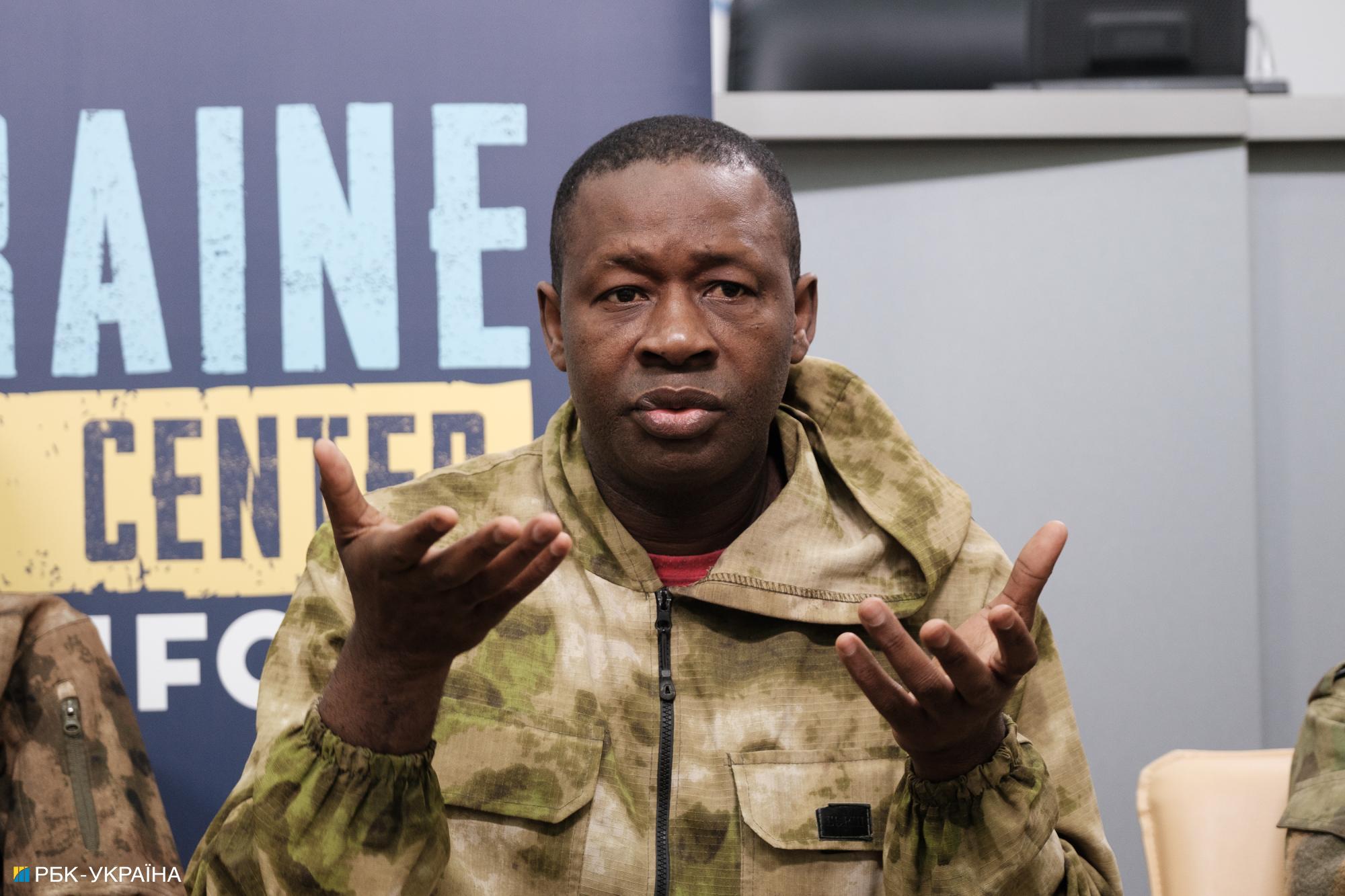 Richard Kanu (photo: Vitalii Nosach/RBC-Ukraine)
Richard Kanu (photo: Vitalii Nosach/RBC-Ukraine)
At the front, Africans were not told much about what they were doing here and why Russia was trying to occupy someone else's territory. In addition to the language barrier, Russians generally did not consider it necessary to explain why an African should suddenly die in Ukraine for the Russian world. Adil recalls one soldier who spoke a little English and said that Russia attacked Ukraine to prevent it from becoming a NATO member. "But I think he was lying to me. I never understood why they were doing it,” the Somali adds.
The status of the foreigners, in this case, Africans and Asians, is still unknown - physically, they are captured, i.e., prisoners of war. But in fact, they are mercenaries, and mercenaries are not covered by the Geneva Conventions. Their status is to be determined by a trial that has not yet begun.
"So far, they have been treated as prisoners of war under the Convention. We can say that often their country of origin does not need them, and Russia certainly does not need them. But if the government of their countries is interested in returning them, we are ready to ensure this,” says Petro Yatsenko.
Speaking of home, Adil and Richard admit that they miss their families very much. Richard talks for a long time about his daughter, who is waiting for him at home and suffers without her father. At the same time, when it comes to plans for the future, the Africans unexpectedly say that they do not want to go home.
- I tell myself sometimes that I cannot start from scratch. If I return to Somalia, yes, my family is there, yes, I will be happy, but I will start from scratch. I will look myself in Europe, I will ask international organizations, anyone, to provide us with a good future.
- So you want to stay in some European country?
- Yes, of course.
Richard agrees with Adil. When asked what about his daughter, the man adds with the same sad expression on his face: “May the Lord be with her.”

